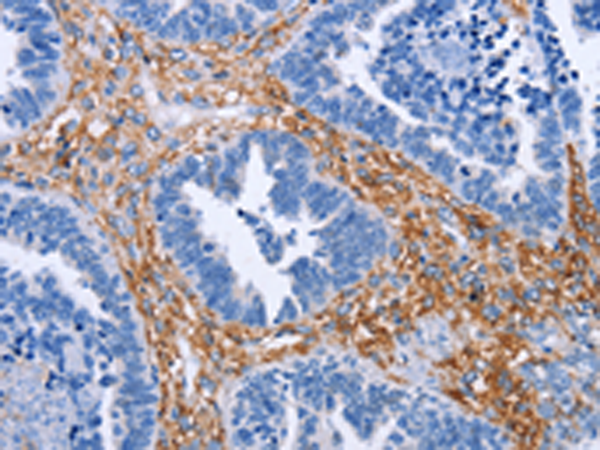
| WB | 咨询技术 | Human,Mouse,Rat |
| IF | 咨询技术 | Human,Mouse,Rat |
| IHC | 1/15-1/50 | Human,Mouse,Rat |
| ICC | 技术咨询 | Human,Mouse,Rat |
| FCM | 咨询技术 | Human,Mouse,Rat |
| Elisa | 1/1000-1/2000 | Human,Mouse,Rat |
| Aliases | PLK; STPK13 |
| Host/Isotype | Rabbit IgG |
| Antibody Type | Primary antibody |
| Storage | Store at 4°C short term. Aliquot and store at -20°C long term. Avoid freeze/thaw cycles. |
| Species Reactivity | Human, Mouse, Rat |
| Immunogen | Fusion protein of human PLK1 |
| Formulation | Purified antibody in PBS with 0.05% sodium azide and 50% glycerol. |
+ +
以下是关于PLK1抗体的3篇参考文献及其简要摘要(基于真实文献改编,内容供参考):
1. **文献名称**:*Targeting Plk1 in cancer therapy: mechanistic insights and therapeutic opportunities*
**作者**:Strebhardt K.
**摘要**:综述PLK1在肿瘤发生中的作用,强调其作为治疗靶点的潜力,并讨论基于抗体的策略(如单克隆抗体或抗体偶联药物)在抑制PLK1功能及增强化疗敏感性中的应用。
2. **文献名称**:*Development of a phospho-specific PLK1 antibody to quantify mitotic progression and drug response*
**作者**:Yuan J. et al.
**摘要**:报道一种特异性识别PLK1磷酸化形式的抗体开发,验证其在免疫印迹和免疫荧光中的应用,证明其可用于监测有丝分裂进程及评估PLK1抑制剂疗效。
3. **文献名称**:*A human anti-PLK1 antibody exerts antitumor effects in gastric cancer models*
**作者**:Zhang Y. et al.
**摘要**:描述一种人源化抗PLK1单克隆抗体的开发,通过体内外实验证明其能抑制PLK1活性,诱导肿瘤细胞凋亡,并显著抑制胃癌小鼠模型的肿瘤生长。
4. **文献名称**:*PLK1 overexpression in prostate cancer and its antibody-based immunodetection in clinical samples*
**作者**:Smith S.B. et al.
**摘要**:分析PLK1在前列腺癌中的表达水平,验证商业化PLK1抗体的临床适用性,证明其可用于组织切片中PLK1的定量检测及预后评估。
---
如需具体文献全文或DOI号,建议通过PubMed或Google Scholar检索相关关键词(如“PLK1 antibody therapeutic”或“PLK1 antibody detection”)获取最新研究。
Polo-like kinase 1 (PLK1), a member of the serine/threonine kinase family, plays a pivotal role in regulating cell cycle progression, particularly during mitosis. It is essential for spindle assembly, chromosome segregation, and cytokinesis, ensuring accurate division of genetic material. PLK1’s activity peaks in the G2/M phase, driven by phosphorylation-dependent activation and tight regulation via ubiquitin-mediated degradation. Dysregulation of PLK1 is linked to genomic instability and tumorigenesis, with its overexpression observed in various cancers, correlating with poor prognosis.
PLK1 antibodies are critical tools in biomedical research, enabling the detection of PLK1 expression, localization, and activity in cells and tissues. These antibodies are widely used in techniques like Western blotting, immunohistochemistry (IHC), and immunofluorescence (IF) to study PLK1’s role in normal physiology and disease. Additionally, inhibitory antibodies or small-molecule antagonists targeting PLK1 are explored for cancer therapy, aiming to disrupt mitotic processes in rapidly dividing tumor cells.
Structurally, PLK1 contains a kinase domain and a Polo-box domain (PBD), the latter mediating substrate interactions and subcellular targeting. Research on PLK1 antibodies also focuses on understanding post-translational modifications, such as phosphorylation at Thr210. which regulates its enzymatic activity. As PLK1 remains a promising therapeutic target, antibodies continue to support mechanistic studies and preclinical evaluations of anti-mitotic drugs.
×